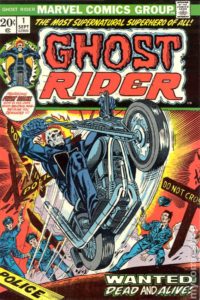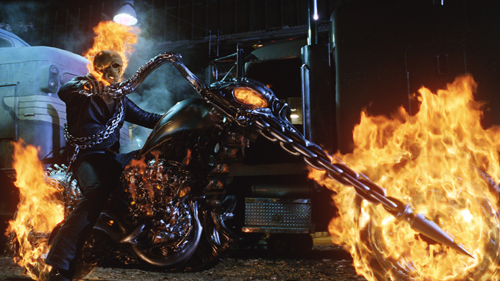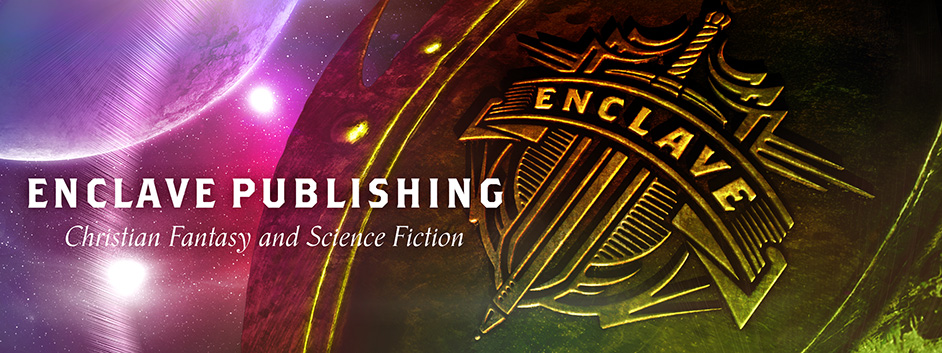A Deal With The Devil
Iâm not much of a comic book fan (I knowâŠblasphemy) and Iâve had my fill with cinematic comic book adaptations *dodges rotten vegetables being hurled through the air.* There is one movie, and character, that Iâve always enjoyed, and if you know me or how my imagination works, this will come as little surprise. In my estimation, Ghost Rider is the beeâs knees. You can keep your capes and tights and masks and mutant powers; Johnny Blaze actually transforms into a fire-skulled demon riding the sickest motorcycle ever created and dispatches evildoers with flames and chains. Darker comic book characters like Batman or the Punisher have nothing on Ghost Rider.

I re-watched both movies this past weekend. I loathe the sequel but the first movie was flawed yet fun in a cheesy Gothic western sort of way. It was heavy metal cinema at its finest and silliest. And as all first movies do, it sets up the central conflict for the protagonist. In the case of Johnny Blaze, he makes a deal with Mephistopheles to save his father from cancer, only to have his father die in an accident. While Mephisto isnât exactly the devil, he is pretty much the devil (played by Peter Fonda, a great choice considering the motorcycle theme of the movie). Johnny doesnât find out the true cost of the deal until several years later, when he horrifically transforms into a fiery spirit that acts as the devilâs bounty hunter. In the presence of evil, he changes into the Ghost Rider and wreaks vengeance upon the wicked. Johnny doesnât enjoy this, of course, and he views this power as a curse rather than a gift since he is unable to control it himself (something he later learns how to do but still doesnât celebrate).
The notion of making a âdeal with the devilâ is a familiar plot device in stories throughout the ages. Classic stories such as Faust and The Monk are more rooted in theology while modern characters like Spawn and  Constantine and movies such as Rosemaryâs Baby and The Devilâs Advocate provide quite a variety of devilish deal-making, usually with tragic results.
Constantine and movies such as Rosemaryâs Baby and The Devilâs Advocate provide quite a variety of devilish deal-making, usually with tragic results.
What does the Bible say about Satan as the infernal used car salesman? Even in the first chapters of Genesis, we see him employ the old âif you do X, then Y will happenâ trick. If you eat the fruit, you will become like God. In Job, God and Satan strike a deal for Jobâs torment, though Satan canât kill Job. The goal is to find out just how deep Jobâs loyalty to God goes. In 1 Samuel, Saul makes a deal with a witch that she will not be punished if she conjures up the spirit of Samuel. And of course, the most audacious deal that Satan ever attempted was to try and convince the Son of God Himself to worship him in exchange for the adoration of the world (Matthew 4).
Satan does not have direct power over us, not in the same way that God does. However, he is a master of trickery and psychological manipulation. He knows how to exploit our weaknesses and make temporal things seem more important than eternal things. Compared to eternity, our greatest earthly suffering is but a puff of smoke, but in that moment of our desperation, he seizes upon our yearning for salvation and instead twists it around so that temporary relief results in eternal damnation. I am currently working on a book where the protagonist disbelievingly dabbles in witchcraft in order to achieve success in his sport, but he will soon discover the disastrous consequences. In fiction, no one ever congratulates themselves on making a deal with the devil. They always regret it in the end.
In real life, few people make an outright deal with the devil (and if they do, Satan is probably laughing at them). But what does happen is seeking help apart from God when our own strength fails. The reason we are given trials and tribulations is to remind us of our weakness and turn our spirits towards God. That is exactly what Satan doesnât want, and he will do anything to stop those prayers from reaching heaven.





































 Realm Makers, the conference for speculative fiction from a “faith-based worldview,” has done a great job bringing in quality keynote speakers right from the start. I couldn’t find a list on the web site, but I know they’ve had Jeff Gerke and Tosca Lee. And this year
Realm Makers, the conference for speculative fiction from a “faith-based worldview,” has done a great job bringing in quality keynote speakers right from the start. I couldn’t find a list on the web site, but I know they’ve had Jeff Gerke and Tosca Lee. And this year  Thomas Locke is an award-winning novelist with total world-wide sales of seven million copies.
Thomas Locke is an award-winning novelist with total world-wide sales of seven million copies. With his twenty-first birthday, Hyam begins a journey that will lead him to his destiny–or his doom.
With his twenty-first birthday, Hyam begins a journey that will lead him to his destiny–or his doom.

 Ronie Kendig is an award-winning, bestselling author of a dozen novels. She grew up an Army brat. Now, she and her husband, an Army veteran, have an adventurous life in Northern Virginia with their children and two dogs–a Maltese Menace and a retired military working dog, VVolt N629. Ronie’s degree in Psychology has helped her pen novels of intense, raw characters. Since launching onto the publishing scene in 2010, Ronie and Rapid-Fire Fiction novels have hit bestseller lists and garnered numerous awards and much critical acclaim.
Ronie Kendig is an award-winning, bestselling author of a dozen novels. She grew up an Army brat. Now, she and her husband, an Army veteran, have an adventurous life in Northern Virginia with their children and two dogs–a Maltese Menace and a retired military working dog, VVolt N629. Ronie’s degree in Psychology has helped her pen novels of intense, raw characters. Since launching onto the publishing scene in 2010, Ronie and Rapid-Fire Fiction novels have hit bestseller lists and garnered numerous awards and much critical acclaim.
 the saying no that bothers me, or even the constantly saying no. Itâs how these successful, creative people say no.
the saying no that bothers me, or even the constantly saying no. Itâs how these successful, creative people say no. creativity â and, it follows, about creative people. âTime,â our author states, âis the raw material of creation.â Time is far more than that; time is the raw material of life, and the time of creative people is no more valuable than that of other mortals.
creativity â and, it follows, about creative people. âTime,â our author states, âis the raw material of creation.â Time is far more than that; time is the raw material of life, and the time of creative people is no more valuable than that of other mortals.
 Welcome to the landscape of Christian entertainment.
Welcome to the landscape of Christian entertainment. I can hardly imagine anyone who doesnât appreciate the quality found within the pages of these timeless tales. Both those were written by Christian authors. Both contained themes obviously derived from a Christian perspective of life and the world.
I can hardly imagine anyone who doesnât appreciate the quality found within the pages of these timeless tales. Both those were written by Christian authors. Both contained themes obviously derived from a Christian perspective of life and the world.

 It’s fitting because Christian speculative fiction seems alive and well. The
It’s fitting because Christian speculative fiction seems alive and well. The  One more bit of good news: this past week I was on the faculty of the Orange County Christian Writers Conference here in Southern California. So were other writers and editors in the speculative genre, such as Merrie Destefano, Mike Duran, Lindsay Franklin, Rachel Marks, and Ben Wolf. Because there were a substantial number of us, as you might expect, a number of conferees with interest in in speculative fiction attended. Some found the number surprising. I didn’t. I’m convinced there are an increasing number of Christians who love the genre, and as a result, more and more are writing speculative fiction. With a few Christian publishing houses which seem committed to the genre, and with more agents open to represent authors writing speculative fiction, some knowledgeable of the general market as well, and with self-publishing a wonderful alternative, I don’t see an end to the number of writers committed to speculative fiction.
One more bit of good news: this past week I was on the faculty of the Orange County Christian Writers Conference here in Southern California. So were other writers and editors in the speculative genre, such as Merrie Destefano, Mike Duran, Lindsay Franklin, Rachel Marks, and Ben Wolf. Because there were a substantial number of us, as you might expect, a number of conferees with interest in in speculative fiction attended. Some found the number surprising. I didn’t. I’m convinced there are an increasing number of Christians who love the genre, and as a result, more and more are writing speculative fiction. With a few Christian publishing houses which seem committed to the genre, and with more agents open to represent authors writing speculative fiction, some knowledgeable of the general market as well, and with self-publishing a wonderful alternative, I don’t see an end to the number of writers committed to speculative fiction.




 Sometimes amazing stories donât look so amazing when they first begin.
Sometimes amazing stories donât look so amazing when they first begin.







